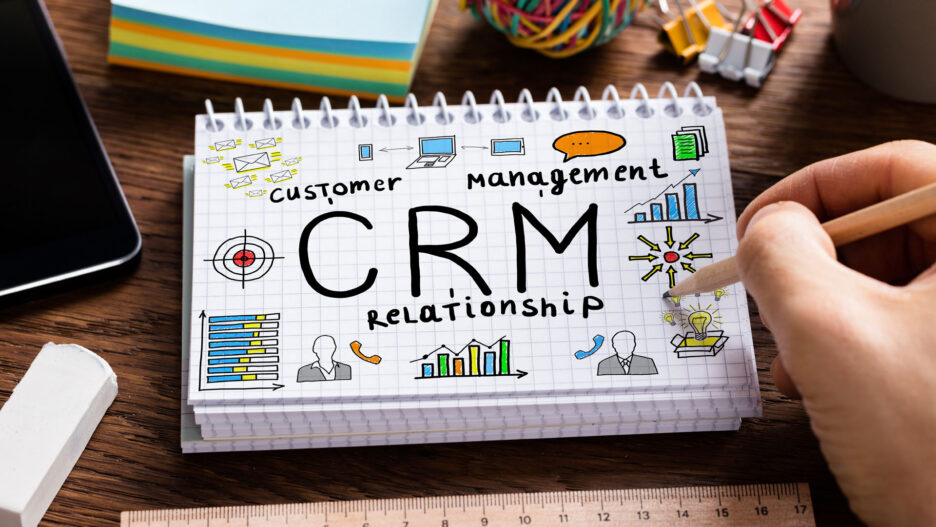Why are Customer Relationship Management systems a must have in the modern world?
In a world where technology and the client are the reigning forces, it is important for companies to consider leveraging the tools and capabilities that a Customer Relationship Management (CRM) system provides.
As Investopedia remarks, CRM is described as “the principles, practices, and guidelines that an organization follows when interacting with its customers.”
With an effective CRM solution, organizations are able to coalesce all activities, strategies, and technologies related to current and prospective customer interactions. CRMs help businesses build a strong and solidly-based relationship with customers, who in turn, repay the positive experience with loyalty, revenue, good reputation, and retention. A CRM system must be a part of a comprehensive business strategy to obtain larger profits and happy clients.
The purpose of CRM solutions is to provide a user-friendly interface that collects and manages customer data to help businesses communicate, engage, retain existing customers, and identify opportunities to attract new customers.
Customer relationships are crucial to the success of any business endeavor, which is why the importance of CRMs can’t be overstressed..
Types of CRM solutions: Operational, Analytical, Strategic, Collaborative
There are multiple types of CRM systems available, but most CRM software essentially focuses on the following categories:
Operational CRM
This type of CRM software usually concerns itself with one of these three types of operations: marketing, sales, or service. Operational CRM deals with historic customer data such as marketing campaigns, purchases, service satisfaction, and more. It’s an important lead generation tool as it automates processes to create a superior experience for both the client and the business. Operational CRM suits companies that strive for a short sales lifecycle and a high repeat sale rate in e-commerce and consumer retail verticals.
Analytical CRM
The analytical CRM system analyzes customer data to help management and decision-making executives design better strategies and understand market trends on a greater scale and with more insight into customer needs. Analytical CRM systems are geared to improve customer satisfaction by using data mining and pattern recognition.
Strategic CRM
The strategic CRM system gathers customer data to use in a repository or knowledge base that helps decision makers support strategies that build long-term customer relationships.
Collaborative CRM
Collaborative CRM systems are based on sharing customer information with outside companies and business to benchmark solutions. By coalescing data with the help of collaborative CRM systems, organizations can build and deliver a superior customer experience based on data that would be otherwise unavailable to them. This type of CRM is a great solution for businesses that place a premium value on innovation and are constantly developing new products.
In an enterprise-level CRM system, these types of systems are interconnected as different modules that address specific aspects of each business process.
Building a CRM strategy
Building a CRM strategy is fundamental to the success and implementation of the system. While there are many options in the market of CRM systems that are incredibly intuitive and practically self-running, it is important to have in place a strategy that takes the most advantage of the features and capabilities the system can provide. Implementing a CRM system effectively is comprised of:
- Collecting data
- Categorizing and storing data
- Granting data access to the necessary parties involved
- Analyzing customer behavior based on the collected data
- Unearthing solutions for efficient and effective digital marketing strategy
- Enhancing the customer relationship experience to grow business opportunities
On top of implementing the CRM solution effectively, users must also design a Customer Relationship Management strategy to leverage the system’s functionality as well as evaluate the criteria that best fits the needs of the organization’s digital marketing strategy. These are the top criteria that must be considered to design a comprehensive CRM strategy:
- The functionality of the CRM system
- The user-friendliness of the CRM system
- The optimization of data in the CRM system
- The architecture and underlying technology of the CRM system
- The vision and mission of how the CRM system is intended to be used
- The cost of the CRM solution
By keeping these criteria clusters in mind when designing the right CRM strategy for a business, managers, marketers, and decision-making executives are capable of boosting efficiency and productivity, improving employee accountability, enhancing the collaboration within the organization, gaining value from data, and streamlining communication with customers.
Starting with a ready-to-use CRM solution
In the industry, it is common to think of big name brands such as Salesforce, SAP, Microsoft Dynamics, and more when considering ready-to-use CRM solutions. These enterprise-grade solutions are highly advanced in terms of CRM functionality, which usually also means they are expensive.
These big CRM software solutions often entail tools to help companies personalize the service and product to a certain extent, but if we’re being honest, not all companies require the enterprise-grade level of service offerings they provide. Every company is unique, so it is no wonder that they want a unique system tailored to their unique needs.
By starting out with a ready-to-use CRM solution, businesses can test what works for them, what suits their needs best, what modules or functionalities of the system are better suited to create successful results for their digital marketing strategy, and what aspects of the system are downright obsolete within their strategy framework. With this insight, companies can then personalize their service or opt to develop their own CRM system.
Customization problem of a standard CRM
Most pre-built CRM solutions are designed to collect customer data, opportunities, orders, contacts, sales information and more to keep track of it and build strategies to attract and retain clients.
While this is true for most CRM solutions, organizations must evaluate how that fits into their strategy, whether they are a small business or a large corporation, because frankly, the outcomes won’t be the same for both ends of the spectrum.
Ready-to-use CRM systems may have a hard time adapting to an organization’s unique needs and requirements as they are designed to serve and function for most businesses, regardless of size or other qualifiers.
Pre-packaged solutions might include what a company needs but you must be prepared to absorb the cost of all the other features it includes as part of the package deal. Robust solutions tend to come with more features than you are likely to use, which makes it more challenging for companies to customize the solution to address only the requirements they need.
CRM customization: pros and cons
Some of the most prominent pros of CRM customization include:
- Personalization: This one is pretty obvious. With a custom CRM solution, you make sure to have the ideal solution for your business.
- Time efficient: A custom CRM solution is designed to fit perfectly into your business’ workflow, making it quick and easy to train in-house teams on how to leverage it as they are already familiar with the workflow.
- Responsiveness: With a custom CRM solution, you are more likely to have the necessary tools and adapt and respond to market or competitor changes on the go. You can quickly shift technology strategies with a CRM that is designed for that purpose.
- Scalability: Custom CRM solutions have a greater chance of scaling quickly and on demand, while robust, off-the-shelf solutions may have a more troubling time in doing so.
- Costs: You pay for what you use and need, instead of having extra features and functionalities that may be obsolete for your digital marketing strategy.
Some drawbacks of choosing a custom CRM solution include:
- Costs: While you only pay for what you use and need, this can be a double-edged sword because you end up investing more during the CRM development stage of the solution. Customizing a solution can be expensive as it entails dedicated CRM development and a support team that attend to the solution specifically, instead of just purchasing a readily-available solution.
- Maintenance: Custom CRM solutions tend to require more maintenance than pre-built solutions as the system requires constant attention to evolve, requiring frequent intervention.
- Development: To create the perfect custom solution, you need to clearly define its purpose, functionalities, and features, which requires a significant amount of time. To add to it, you need to have a talented team of developers that will take all of that into consideration to develop the perfect solution. This can be a constraint if you don’t have the right CRM development team in place that guides you through every step of the way.
Selecting the main criteria for custom CRM solutions
As businesses grow, the need for a comprehensive CRM solution grows as well. Custom CRM solutions can be a great alternative to quality, ready-made CRM solutions that are in most cases, relatively expensive.
More than that, sometimes organizations don’t require the full spectrum of capabilities and features that a ready-made CRM solution offers as they are very comprehensive and complete in their service offerings. For this reason, many businesses choose to create a custom CRM solution that specifically fits their needs and addresses their particular set of specifications.
With a custom CRM solution, organizations pay for what they need rather than purchasing an entire software CRM suite that delivers more than what they bargained for. Additionally, custom CRM solutions are usually created under the company’s umbrella of workflow and guidance, thus reducing significantly the time employees and direct users will spend getting acquainted with the solution as it will look, feel, and behave as an in-house tool that complies with the company’s processes.
The main criteria to consider to build a custom CRM solution are:
- Tailored to unique functionalities and exact needs: While most ready-to-use CRM systems are designed to serve most businesses, they don’t necessarily meet a company’s specific wishlist of features. Pre-built CRMs are packed with a wide assortment of functions that may not be relevant to your organization, which adds costs and complexity to a process. With a custom-built CRM solution, companies get exactly what they want, how they want it, and in compliance with their exact needs. This helps avoid added complexity, costs, time, and resources as it is easier to train employees on a system that is based on a workflow they are familiar with.
- Integration of CRM with other systems and with the business operation: Companies oftentimes require their CRM solution to integrate easily and seamlessly with other websites or 3rd party services to exchange and share data efficiently. CRM solutions usually pair up with services such as Google Apps, accounting apps, Microsoft Office, project management apps, email services, time tracking apps, and more. With a custom-built CRM solution, clients make sure the solution integrates with other external services as well as with in-house processes across multiple departments of the business operation.
- Scalability: When selecting a CRM solution, is important to plan for the future and the growth you anticipate in the short and long term. By conducting a scalability forecast, companies can assess how a custom-built CRM solution can fit into the growth strategy to understand the features and functions it must include when the extension begins. Many ready-to-use CRM systems have system limitations that prevent them from growing at the rate a specific business requires, but with a custom-built solution, a e design for adaptation and growth can be included.
- Pricing: Existing CRM solutions are robust and as we mentioned before, packed with features and functionalities to appeal to and serve most businesses. These comprehensive systems tend to be on the expensive side of the scale, making it a hefty investment for many companies that may not be capable or large enough to leverage all of the benefits and tools the solution has to offer. With a custom-built CRM solution, companies pay for what they need, making it easier to budget into their digital marketing strategy.
- Migration from an existing CRM to a new CRM: Companies that have already purchased a CRM system may discover after using it that it does not meet or comply with their specific set of needs and wants, which prompts them to look for a custom solution that does. Transitioning from an existing CRM system to a brand new CRM system can be challenging, but by developing a custom CRM, users can plan ahead to make it pain-free to transfer collected data, analytics research, and other relevant aspects of the existing CRM solution. It’s important to take into account both the technical and business aspects of migrating CRM systems. Custom CRM development helps migrate systems in a hassle-free experience with a minimum compromise on requirements, reproducing functionalities, saving business logic, extracting data from different sources, restoring all integrations, synchronizing all systems, and overall, migrating effortlessly.
- Security: CRM systems, both custom-built and pre-built, are based on data. It is extremely important to put data security at the forefront of any CRM solution, as it is its foundation. With that being clarified, custom CRM solutions, by nature, , are more secure as they are not open source. It is harder for attackers to hack the servers of a custom solution than a pre-built solution that is open source. In custom solutions, data server access is only provided to the client and the development team, which makes it harder to hack databases or extract any confidential information as the system most likely will be encrypted or require tokens for sensitive data.
Cost and problems of supporting custom CRM solutions
Whether it’s an out-of-the-box or custom CRM solution, it is virtually impossible to predict each challenge or issue that may arise in a system, but being ready for any challenging scenario makes a valuable difference.
The overall price of a CRM software solution depends on several factors that include the number of features, the difficulty of the project, the scope of the project, the costs of deployment, support and maintenance, level of customization, and more.
While customization sounds ideal for every company, it is sometimes not feasible due to costs and resources. Sometimes, custom CRM solutions end up being more expensive in the long-run than pre-built systems due to the added costs of development, maintenance, continuous improvements, and more.
Conclusion
Custom CRM solutions aren’t a boxed, one-time development effort; instead, they are an ongoing process of continuous improvement for the system and the overall business operation.
Similar to the process of buying a house, you can choose a cookie-cutter house that is built by a big development firm that designs all house in a similar fashion, but that ultimately serves the purpose of what the resident will need. Or, you can design your own house, with its unique set of features where everything fits comfortably and specifically check-marks all the items in your wish list. Tempting, right?
As technologies improve and emerge quickly, it’s important to decide whether to develop a custom-built CRM solution that provides unique business models with an advantage over competitors who use off-the-shelf software that may underperform under specific circumstances.
Why Svitla?
At Svitla Systems, we can help you get to the next level of your digital marketing strategy by helping you build a custom-built CRM solution that addresses your specific needs and requirements, which helps drive sales and improve the overall customer relationship with your clients.
Want to learn more about how we can help you? Answer the form below and our sales team will be in contact shortly.





